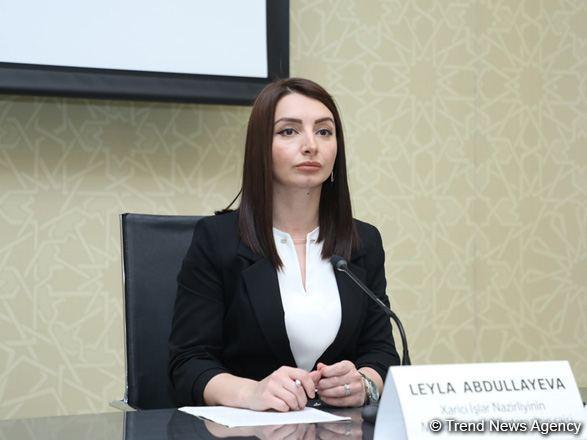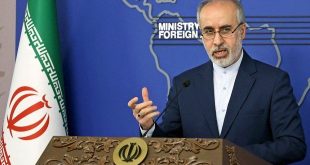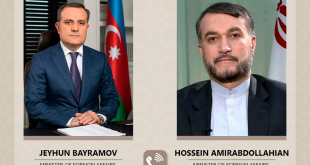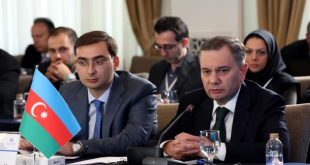
Baku has dismissed as unfounded allegations that third forces are located near the Azerbaijani-Iranian border, the Foreign Ministry said on October 4.
Foreign Ministry Spokesperson Leyla Abdullayeva made the remarks to comment on Iranian Foreign Minister Hossein Amir Abdollahian’s recent interview.
“Firstly, we would like to emphasize that, as Iranian Foreign Minister Hossein Amir Abdollahian noted in an interview with a local TV channel, relations between the peoples of Azerbaijan and Iran are at the highest level. Relations between Azerbaijan and Iran are based on historical ties, friendship, and cooperation. We do not accept the allegations about the presence of any third forces near the Azerbaijani-Iranian border and about the provocative attempts of these forces because these views are unfounded,” Abdullayeva said.
She reiterated that relations between Azerbaijan and Iran are based on strong historical ties, friendship, and cooperation. She ruled out any threat to Azerbaijan and its neighbors.
“In general, the presence on the territory of Azerbaijan of any forces, including terrorist ones, which may pose a threat to our state and neighboring countries, cannot be a subject of discussion. Unfortunately, even during the 44-day Patriotic War, some parties voiced such unfounded allegations. We said it back then and we’re saying it now – such allegations are unfounded, and to this day the Azerbaijani side was not presented with any relevant evidence to prove the opposite,” Abdullayeva said.
The spokesperson stressed that the inviolability of internationally recognized borders is one of the fundamental principles that Azerbaijan has always been guided by.
She recalled that Azerbaijan has suffered for decades from the military occupation of part of its territory and the violation of its international borders.
“More than 130 kilometers of our border with Iran were under Armenian occupation for many years. Unfortunately, over the years we have not heard from the friendly Iranian state such a harsh reaction as now, regarding the occupation of a part of our border,” Abdullayeva said.
The spokesperson stressed that Azerbaijan supports the establishment of relations with all countries on the basis of respect for each other’s international borders, which is the unchanging position of the country.
She recalled that Azerbaijan also expressed its readiness to normalize ties with Armenia on the basis of fundamental principles of international law and start talks on the delimitation of borders.
“The process of delimiting the border between Azerbaijan and Armenia is a bilateral issue, and the recent positive signals from the opposite side allow us to hope for the development of this process in a constructive manner,” Abdullayeva noted.
As far as external forces are concerned, Azerbaijan has always led an independent foreign policy based on its national interests and proved this with its specific steps repeatedly during 30 years, she added.
“The development of friendly and good-neighborly relations with neighboring countries is one of the main priorities of Azerbaijan’s foreign policy, and we are constantly taking steps in this direction,” the spokesperson underlined.
Abdullayeva noted that Azerbaijan is very sensitive to the issue of Islamic solidarity and, as is well known, is distinguished by its active position in the Organization of Islamic Cooperation (OIC).
“Over the past decades, Azerbaijan has been focusing on the destruction, plundering of the Islamic cultural and historical heritage on its territory and highly appreciates the support in this matter of its fair position by the OIC countries,” she said.
“We believe that the end of the occupation of Azerbaijani territories, the illegal actions of Armenia in this region, including the concentration of large quantities of weapons and ammunition, illegal economic and other actions, drug smuggling, training of terrorists, destruction, and desecration of monuments of Islamic religion and culture, as well as the return of former refugees to their native lands after 30 years of separation, ensuring stability and security in the region must meet the interests of Iran,” Abdullayeva concluded.
By Vafa Ismayilova
 Oval Useful news from Azerbaijan and Caucasus
Oval Useful news from Azerbaijan and Caucasus


